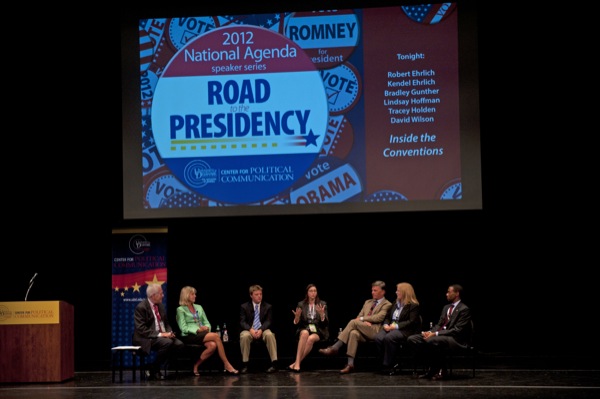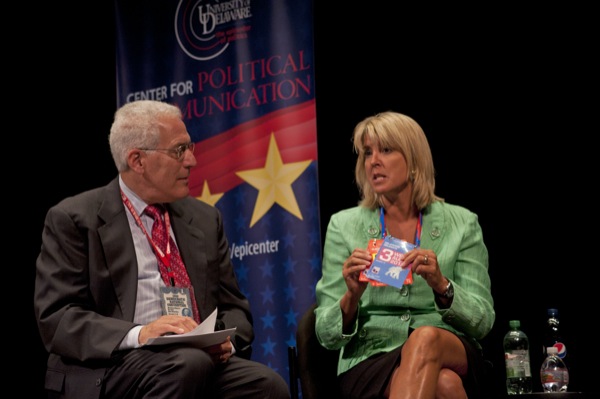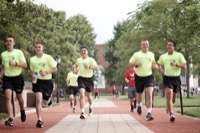

National Agenda
University panel offers insights into national political conventions
4:27 p.m., Sept. 13, 2012--Colorful and highly charged conventions remain an important part of American politics despite a number of concerns -- among them high costs, tight security, heavily vetted and teleprompted speeches and stage-managed sign waving -- panelists in the opening presentation of the University of Delaware’s National Agenda 2012 speaker series said Wednesday, Sept. 14, in Mitchell Hall.
The topic of the presentation was “Inside the Political Conventions,” and panelists included three people who attended the Republican convention in Tampa, Fla. – senior political science major Bradley Gunther, former Maryland governor and congressman Robert Ehrlich and his wife Kendel Ehrlich, a UD alumna – and three who attended the Democratic convention in Charlotte, N.C. – UD faculty members Lindsay Hoffman, David Wilson and Tracey Holden, who are affiliated with UD’s Center for Political Communication.
People Stories
'Resilience Engineering'
Reviresco June run
Panelists agreed that the atmosphere on the floor of the conventions was often electric despite the fact that what was happening was thoroughly scripted and choreographed political theatre.
Robert Ehrlich, who first won elected office as a member of the Maryland House of Delegates in 1986, said he has seen substantial changes in political conventions through the years.
In years past, Ehrlich said, conventions featured backroom bartering and a fair amount of wheeling and dealing among the candidates. Today the deals are “relatively minor” and he does not anticipate that will change any time soon.
“It’s a show,” he said. “It is an excuse to have a party and an opportunity for one big, giant infomercial.”
Kendel Erhlich said that while the conventions are a show, they also serve “a real purpose” in providing parties and nominees a forum to present their message. She questioned whether future conventions might be compressed into shorter time spans.
“This is one chance every four years when both parties are put on stage to tell us what they stand for,” Hoffman, an assistant professor of communication, said, adding that there are “stark differences” in the messages of Republican nominee Mitt Romney and Democratic President Barack Obama.
Political energy
Despite the staging and orchestration of the conventions, Holden, also an assistant professor of communication, said there “was still an amazing energy.” And Wilson, an associate professor of political science and international relations, said he was impressed with how easy it was to generate enthusiasm among the delegates.
Gunther, attending his first national convention, said the experience was exhilarating as he got to speak with Pennsylvania Gov. Tom Corbett, meet delegates from all over the country and watch correspondents for The Daily Show with Jon Stewart at work, noting that the latter were much more serious in person than on television.
Gunther likened the climate among the delegates to sitting in the upper reaches of Lincoln Financial Field for a Philadelphia Eagles game, saying that delegates from Texas came in costume every day of the event. Delegates are “like the diehard fans of any professional sports team,” he said.
Holden, who spent time with members of the Delaware delegation, found that the delegates knew that they were not just “props” to hold signs at the convention but that they “felt very much that they play an important role in what happens every day for their party, for their state, for the election at large. We forget that these are people who genuinely care.”
Media
From television suites in the main halls to social media row to bloggers scattered through the buildings, “everything at the convention is about the media,” Kendel Ehrlich said. “So much of politics is intertwined with that.”
Media provides a venue to get the message out and to frame impressions, she said.
An unscripted moment
While nearly every moment at the conventions was scripted, at least one raised by a member of the audience during a question and answer session was not – the speech at the Republican convention by actor Clint Eastwood as he talked to an empty chair.
“You don’t want to upset Dirty Harry,” Robert Ehrlich said, and Gunther said he saw it as more of a performance than a speech and that it had the desired effect of revving up the crowd.
Wilson said he believed the episode was clearly a mistake and that the Republicans invited additional unwanted media scrutiny by not simply owning up to the mistake and moving on.
As to some of the better speeches and more moving moments, panelists pointed to Michelle Obama, Ann Romney, Condoleezza Rice, Marco Rubio and Bill Clinton.
Hoffman said she was touched by the recitation of the Pledge of Allegiance by former U.S. Rep. Gabrielle Giffords, still recovering following a 2011 shooting in her home state of Arizona.
Holden, who teaches public speaking, said she was impressed by Miami Dade College student Angie Flores, who introduced Jill Biden, a UD alumna and wife of Vice President Joe Biden, himself a UD alumnus, at the Democratic convention. Although Flores might have had assistance with the text, Holden said “the style, the delivery, the poise were all hers.”
Sept. 19 presentation
The series will continue at 7:30 p.m., Wednesday, Sept. 19, with a presentation by political journalist Amy Walter on “The Media and the Campaign.” Walter is the political director for ABC News and former editor-in-chief of National Journal’s The Hotline.
National Agenda is sponsored by UD’s Center for Political Communication. This fall’s theme is “Road to the Presidency.”
Sessions are moderated by Ralph Begleiter, center director.
Article by Neil Thomas
Photos by Duane Perry










